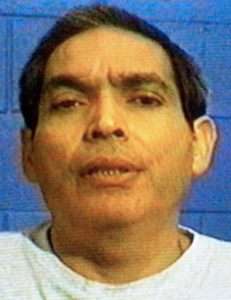Juan Garza was executed by the Federal Government under the 1988 federal Anti-Drug Abuse Act
According to court documents Juan Garza was a drug kingpin who was responsible for the importation of thousands of pounds of marijuana throughout the United States. Through his criminal empire he was responsible for at least three murders. Juan would be arrested under the 1988 federal Anti-Drug Abuse Act which imposes a death sentence if murder was committed to further his criminal empire
Juan Garza would be executed by lethal injection on June 19 2001
Juan Garza Photos

Juan Garza FAQ
When Was Juan Garza Executed
Juan Garza was executed on June 19 2001
Juan Garza Case
Convicted killer Juan Raul Garza dies by lethal injection in a U.S. prison after a clemency plea to President George W. Bush failed. It is the second federal execution in eight days — after 38 without any federal executions. Garza was pronounced dead at 7:09 a.m. local time (8:09 a.m. EDT) Garza showed very little emotion and seemed ready to die, according to several media witnesses. They said he apologized and asked for forgiveness in his final statement before the execution began.
Media witness Karen Hensel said Garza made a final statement before his execution. “He said ‘I want to say that I’m sorry. I apologize for all the pain and grief that I caused. I ask for your forgiveness and God bless,’ ” Hensel said. “At that point he did somewhat of a sigh, like it’s over.”
Added Karen Grunden, another media observer: “There was not really a point at any time where you could actually say he died. There was no final breath that we noticed at all.”
Garza’s and McVeigh’s deaths are the only two federal executions since 1963.
Prison spokesman Jim Cross said Garza had spent the last few hours watching television, talking with staff, seeing the prison chaplain, and speaking to his spiritual adviser. Cross would not release the name of the witnesses Garza asked to watch his execution. The White House Monday night announced that President Bush had denied Garza’s petition for clemency, which argued that the federal death penalty is biased against minorities. Garza is Hispanic.
“The president found no grounds to grant clemency in this case,” said White House spokesman Ari Fleischer. Garza’s attorneys, who were rebuffed by the Supreme Court twice Monday, were informed of Bush’s decision after deciding not to pursue additional appeals. Garza, 44, a confessed drug trafficker, was sentenced to death in August, 1993 in Texas for murdering or ordering the murders of three other drug traffickers in an attempt to gain control of distribution networks. He was sentenced to death for each of the murders under a federal “drug kingpin” statute.
The U.S. Supreme Court, without comment, rejected two petitions by Garza Monday. The first argued that his sentencing jury had not been adequately instructed on the alternative of life in prison without parole, and the second maintained that human rights provisions of an international agreement had been violated. Garza was born in Brownsville, Texas, the son of Hispanic migrant workers. He has two children ages 9 and 12, and had ratcheted up his pleas for leniency as the execution date neared. Last year, he received two stays from President Clinton, including one in December just days before his scheduled execution, delaying it for six months to allow federal authorities to review the case.
The Bush administration had given many signals that it would not approve the clemency request, which argued that the federal death penalty is biased against minorities. In a statement, Attorney General John Ashcroft said there is no reason to spare Garza’s life. He said Garza was responsible for the three deaths and five others — including at least four murders in Mexico for which he was never prosecuted. Ashcroft also said there was no racial bias in the case, emphasizing the prosecutor was Hispanic, as were seven of the eight victims. The Department of Justice, as well, said a recently completed study found no racial bias in the federal system. Garza’s attorney John Howley strongly disagreed, saying “there’s no question that race plays a big part in every death sentence.” “The fact is we only give out the death penalty in this country to poor, to minorities, and to the mentally retarded,” he said.









